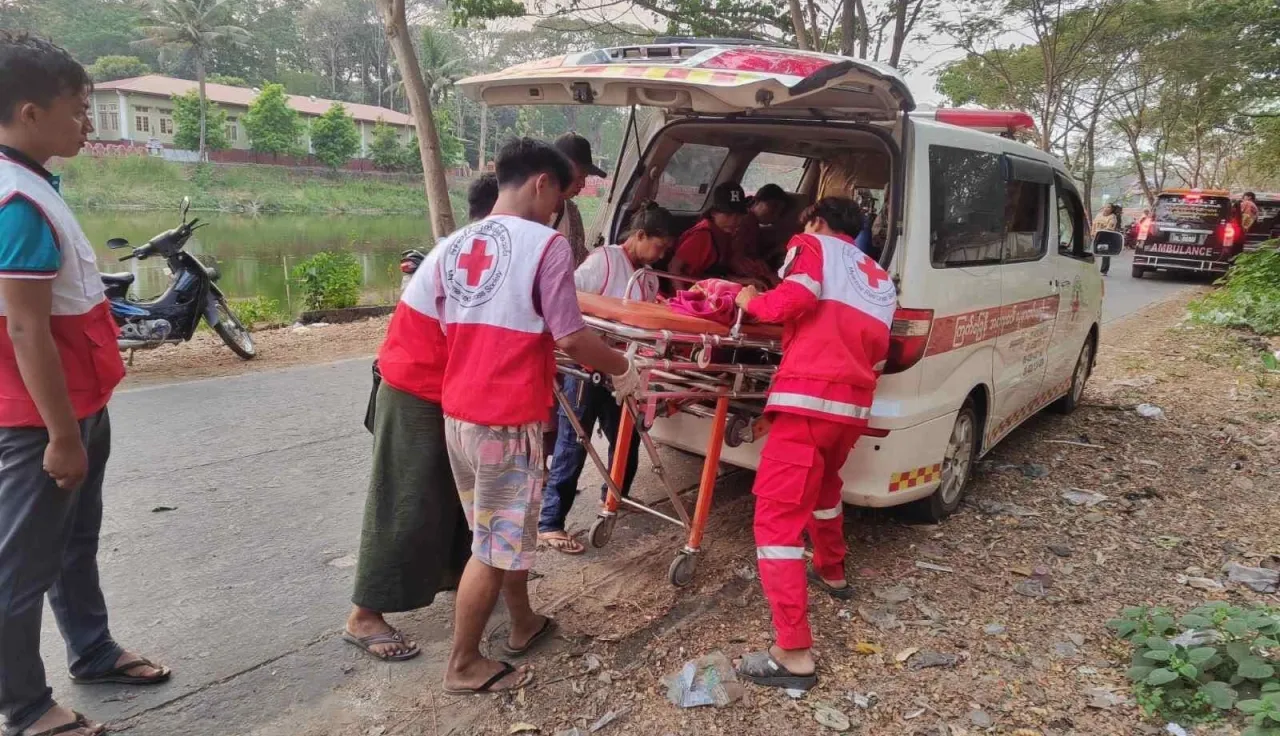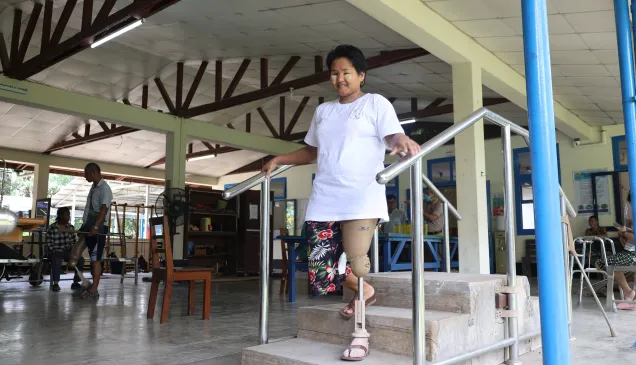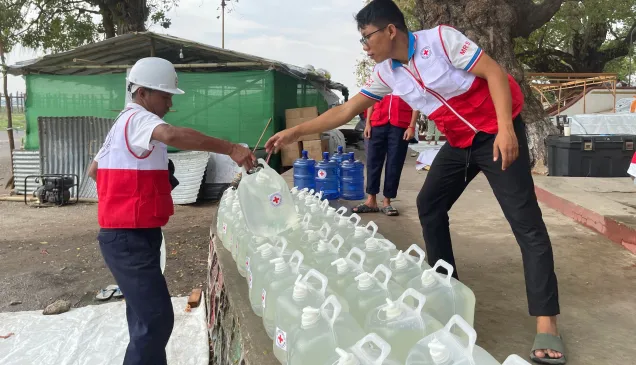Frequently asked questions about the ICRC's work in Myanmar

Useful information
Humanitarian and relief organizations are facing significant challenges to reach those in need. However, our commitment to help is always there.
Please remember that all services provided by humanitarian organizations are free. If anyone claiming to work with the ICRC is asking you for money or favors in exchange for aid, kindly report it by contacting our team on the ground.
-
We have teams in Kachin, Kayin, Mon, Bago East, Rakhine, Shan, Mandalay, and Yangon. In Mandalay, where the population was highly affected by the 28 March earthquake, we focus on providing the Myanmar Red Cross, other local responders, and health authorities with the support they need to reach those in urgent need. (See more information of our earthquake response).
In the areas affected by armed conflict and other situations of violence we provide communities with their daily essentials and vital information regarding the risks of explosive hazards. Whenever possible, we also encourage communities to start livelihood initiatives.
We also support hospitals and other health structures with medicines and medical equipment. Through our physical rehabilitation programme, people with disabilities are able to receive orthopedic footwear and mobility devices.
We support families, helping them visit their detained relatives, and we assist people after their release from detention so they can return home with dignity. We also work to clarify the fate and whereabouts of missing relatives and, whenever possible, help reunite families.
Together with the Myanmar Red Cross Society and community based civil societies, we organize first aid and pre-hospital care training sessions for those helping people in emergency situations.
-
You can reach out to the ICRC by calling +95 977 666 2555
Opening hours are from Monday to Friday from 8 a.m. to 4:30 p.m.
You can also send us a message on ICRC Facebook Myanmar.
-
If you are in Myanmar, you can reach out to the ICRC by calling +95 977 666 2555 or contact the Myanmar Red Cross Society (MRCS) at +95 995 755 7000.
If you are outside Myanmar, please reach out to your closest Red Cross or Red Crescent Society or the ICRC office. You can find a directory here.
-
Only trained people should do the proper and dignified recovery of the deceased. Please do not try to move or handle them before authorities or trained personnel arrive. Doing so can jeopardize the possibility of later identifying the person and giving answers to the family.
Please know that the deceased from natural disasters and violent incidents do not cause epidemics, because they usually die from trauma and are not infectious. The risk to the public is negligible. As time passes the odor from the deceased will increase, but it is not harmful.
-
In Myanmar, the Myanmar Red Cross Society (MRCS) plays a leading role in emergencies and natural disasters. They also operate ambulance services in some locations.
MRCS Ambulance +95 9 669 958 858
For more information or to contact your nearest branch, please visit the Myanmar Red Cross Society Facebook.
The way we work
-
In Myanmar, the ICRC’s response consists of emergency aid and long-term assistance. During acute crises, we distribute food and household items to address urgent needs. During long-term crises, we support affected families by enhancing their ability to generate income.
Our assistance includes improving living conditions and access to clean water and health-care facilities. Our teams work to promote respect for international humanitarian law (IHL) and to spread knowledge of weapon contamination risks.
We visit prisons and engage with the detaining authorities in order to secure humane treatment, adequate living conditions and family contact for all detainees. When needed, we offer our services to restore contact between the detainees and their loved ones. While we seek access to all detainees, our ability to visit specific locations depends on ongoing dialogue and consent from the authorities.
-
The 7.7 magnitude earthquake on 28 March devastated communities across Myanmar, resulting in thousands of people killed, injured, displaced, or unaccounted for. Entire neighbourhoods were reduced to rubble, with widespread damage to homes, hospitals, roads, and other vital infrastructure.
This disaster struck a population already deeply affected by ongoing armed conflict and humanitarian challenges. From the outset, the ICRC has been working alongside the Myanmar Red Cross Society (MRCS) and local civil society partners to respond to urgent needs—particularly in hard-hit areas such as Mandalay, Sagaing and Southern Shan State.
Over the past six months, the ICRC has supported emergency health care, distributed essential relief items including shelter materials and water filters, restored access to clean water and sanitation, and helped reconnect separated family members. We also contributed to risk awareness activities in areas affected by explosive hazards.
As we reach the six-month mark, the ICRC is transitioning towards coordinated recovery and resilience efforts, in close collaboration with local authorities, MRCS, and other Red Cross and Red Crescent Movement partners. These efforts focus on restoring essential services, supporting livelihoods, and reinforcing community preparedness in areas most affected by the earthquake.
For the latest updates on our work, please visit our Myanmar country page.
-
The ICRC operates under the fundamental principles of neutrality, impartiality, and independence. In Myanmar, we maintain direct dialogue with all stakeholders to ensure that our humanitarian work is carried out without political or military influence. We negotiate access independently, assess needs objectively, and provide assistance directly to communities affected by conflict, violence, and disasters.
-
Carrying out our humanitarian work in Myanmar is complex due to ongoing armed conflicts, administrative restrictions and logistical challenges such as roadblocks and damaged infrastructure. Additionally, navigating a sensitive political environment while maintaining neutrality is an ongoing challenge.
-
Individuals can support the ICRC’s humanitarian efforts by making financial contributions through our official donation platform. These funds help us provide essential aid, including food, medical assistance, and emergency relief, to affected communities.
-
Donations can be made directly through the ICRC’s official website, ensuring that funds go directly to humanitarian operations. The ICRC does not rely on third-party crowdfunding platforms for fundraising.
-
The ICRC provides technical, financial, and material support to MRCS to enhance its emergency response capacity. This includes first aid training, logistics support, and assistance in delivering aid to hard-to-reach areas. The collaboration is based on shared humanitarian goals and strict adherence to neutrality.
-
Yes, the ICRC coordinates with various humanitarian organizations, including the MRCS, UN agencies, and NGOs, to ensure that aid reaches those in need effectively. However, we maintain our independent operations and do not align with any political entity.
-
The ICRC provides assistance directly to affected populations whenever possible. We coordinate our activities with relevant authorities and humanitarian actors, to facilitate access and avoid duplication, but we do not operate through political or military entities. Our humanitarian response is strictly guided by the principles of neutrality, impartiality, and independence.
-
The ICRC works to ensure that all detainees, regardless of the reasons for their detention, receive humane treatment and adequate living conditions. This engagement takes place within the framework of our confidential and bilateral dialogue with the relevant authorities, and we cannot disclose its content publicly or to third parties. This includes public comment on individual detainees.
-
Yes, the ICRC prioritizes assistance based on humanitarian needs, focusing on the most affected and vulnerable populations. We work to reach remote and difficult-to-access areas whenever possible.
-
The ICRC ensures that donations are used efficiently, with the majority of funds going directly to humanitarian operations. As an independent humanitarian organization, we have strict financial accountability measures in place to maximize aid delivery.
Read more about our funding and spending.
You can also find here:
- The ICRC: Frequently asked questions about our work
-
- Our latest Facts and Figures in Myanmar: Operational Facts and Figures – Jan - Dec 2024
- Frequently asked questions on the rules of war
- General FAQs about our funding and spending
- To support our emergency relief efforts: URGENT: MYANMAR EARTHQUAKES



